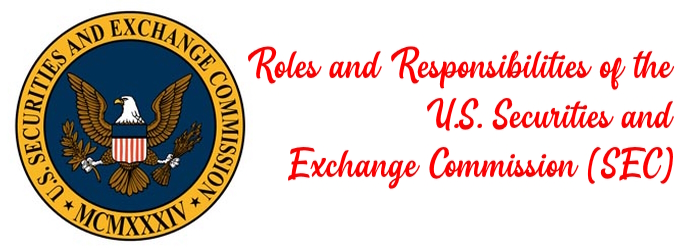Roles and Responsibilities of the U.S. Securities and Exchange Commission (SEC)
The U.S. Securities and Exchange Commission (SEC) is an independent agency tasked with the responsibility of regulating and overseeing the securities industry in the United States. Established in 1934, the SEC plays a crucial role in maintaining fair and efficient markets, protecting investors, and facilitating capital formation. In this article, we will explore ten key roles and responsibilities of the SEC, highlighting their significance and providing relevant examples to illustrate their impact on the financial landscape.

Table of Contents
- 1 Ten key roles and responsibilities of the SEC
- 1.1 Investor Education
- 1.2 Enforcement of Securities Laws
- 1.3 Financial Disclosure and Reporting
- 1.4 Regulation of Securities Offerings
- 1.5 Oversight of Securities Exchanges
- 1.6 Corporate Governance and Proxy Voting
- 1.7 Regulation of Investment Advisers and Mutual Funds
- 1.8 Regulation of Broker-Dealers
- 1.9 Regulation of Credit Rating Agencies
- 1.10 International Cooperation
- 2 Conclusion
Ten key roles and responsibilities of the SEC
Investor Education
The SEC is committed to educating and empowering investors. It provides resources and information to help individuals make informed investment decisions. Through its website, publications, investor alerts, and educational initiatives, the SEC equips investors with knowledge about various investment options, risk factors, and how to identify and avoid fraudulent schemes.
For example, the SEC’s “Investor.gov” website offers valuable resources such as guides, articles, and interactive tools to educate investors about financial markets, investment products, and the importance of diversification. By promoting investor education, the SEC aims to enhance the public’s understanding of investment risks and opportunities.
Enforcement of Securities Laws
One of the primary responsibilities of the SEC is to enforce federal securities laws. It investigates potential violations and takes legal action against individuals and entities engaged in fraudulent or illegal activities. The SEC’s enforcement actions can range from civil lawsuits to criminal prosecutions, depending on the severity of the violation.
For instance, the SEC may file civil lawsuits seeking disgorgement of ill-gotten gains, injunctions to prevent further violations, and monetary penalties. In more serious cases, the SEC may work in conjunction with law enforcement agencies, such as the Department of Justice, to pursue criminal charges.
A notable example of the SEC’s enforcement actions is the case against Bernie Madoff, who orchestrated one of the largest Ponzi schemes in history. The SEC’s investigation led to Madoff’s arrest, subsequent conviction, and recovery of billions of dollars for defrauded investors.
Financial Disclosure and Reporting
The SEC mandates that publicly traded companies uphold the responsibility of providing investors with precise and timely financial information. It reviews registration statements, periodic reports, and proxy statements to ensure compliance with disclosure requirements. By enforcing transparent financial reporting, the SEC promotes investor confidence and prevents fraudulent practices.
For instance, companies are required to file annual reports (Form 10-K) and quarterly reports (Form 10-Q) with the SEC, providing detailed financial information. This enables investors to make informed decisions based on reliable and up-to-date data.
A notable example is the case of Enron, where the SEC’s scrutiny of the company’s financial disclosures revealed accounting irregularities and fraudulent practices. This led to the exposure of one of the largest corporate accounting scandals and subsequent reforms in financial reporting.
Regulation of Securities Offerings
The SEC regulates the issuance and sale of securities, including initial public offerings (IPOs) and ongoing offerings. It reviews registration statements to ensure compliance with disclosure requirements, protecting investors from fraud or misleading information.
For instance, before conducting an IPO, companies must submit a registration statement (Form S-1) to the SEC, disclosing vital information about the company’s business, financials, and risks associated with the investment. The SEC reviews these statements to verify their accuracy and completeness.
A notable example is the IPO of Facebook in 2012. The SEC conducted a thorough review of Facebook’s registration statement, uncovering deficiencies and requiring additional disclosures. This process helps safeguard investors by ensuring that they receive relevant information before investing in securities.
Oversight of Securities Exchanges
The SEC oversees securities exchanges, ensuring they operate fairly and efficiently. It sets rules and regulations for market participants, such as securities exchanges, brokers, dealers, and self-regulatory organizations (SROs) like FINRA (Financial Industry Regulatory Authority). The SEC’s oversight aims to maintain market integrity and protect investors from abusive practices.
For example, the SEC monitors the activities of securities exchanges to ensure they provide fair and transparent trading environments. It reviews their rules and regulations, conducts inspections, and investigates potential violations. If an exchange is found to be non-compliant, the SEC can take corrective actions or impose penalties to rectify the situation.
A notable example is the SEC’s oversight of the New York Stock Exchange (NYSE) and NASDAQ, the two largest stock exchanges in the United States. The SEC works closely with these exchanges to ensure they follow proper procedures, adhere to regulations, and maintain fair trading practices.
Corporate Governance and Proxy Voting
The SEC plays a significant role in promoting good corporate governance practices. It requires companies to disclose information regarding executive compensation, board structures, and related party transactions. By doing so, the SEC aims to enhance transparency and accountability within companies.
For instance, the SEC’s regulations require companies to file proxy statements (Form DEF 14A) before shareholder meetings. These statements contain crucial information, including voting matters, director nominations, and executive compensation. Shareholders can review this information to make informed decisions and exercise their voting rights effectively.
A notable example is the increased focus on executive compensation disclosures following the financial crisis of 2008. The SEC implemented regulations requiring companies to provide more transparent and detailed information about executive pay, helping shareholders assess the alignment between compensation and performance.
Regulation of Investment Advisers and Mutual Funds
The SEC regulates investment advisers, ensuring they adhere to fiduciary duties and provide appropriate advice to clients. It sets standards for disclosure, registration, and conduct, aiming to protect investors and maintain the integrity of the investment advisory industry.
For example, the SEC requires investment advisers to register with the commission and provide detailed disclosures about their business practices, fees, and potential conflicts of interest. By reviewing registration documents and conducting examinations, the SEC identifies any violations or risks to investors.
In the case of mutual funds, the SEC regulates their registration, disclosure, and operations. It reviews prospectuses and monitors fund activities to ensure compliance with regulations and protect investors’ interests.
A notable example is the enforcement action taken by the SEC against fraudulent investment advisers who misled clients and misappropriated their funds. Through diligent oversight and enforcement, the SEC safeguards investors from such illicit practices.
Regulation of Broker-Dealers
The SEC regulates broker-dealers, who facilitate the buying and selling of securities. It sets rules and standards to ensure fair dealing, market transparency, and investor protection in the brokerage industry.
For instance, broker-dealers must register with the SEC and become members of SROs like FINRA. They must adhere to regulations related to customer protection, anti-money laundering, and record-keeping. The SEC conducts examinations to monitor compliance and takes enforcement actions against violators.
A notable example is the SEC’s enforcement actions against broker-dealers involved in fraudulent sales practices or inadequate supervision. These actions help maintain the integrity of the brokerage industry and protect investors from unscrupulous activities.
Regulation of Credit Rating Agencies
The SEC regulates credit rating agencies to ensure the accuracy and integrity of credit ratings provided to investors. It aims to prevent conflicts of interest and enhance the transparency and reliability of credit ratings.
Credit rating agencies are required to register with the SEC and adhere to specific rules and standards. The SEC conducts examinations and reviews the methodologies used by these agencies to assign credit ratings. It takes action against agencies that fail to meet regulatory requirements.
A notable example is the SEC’s actions following the financial crisis of 2008, where credit rating agencies were criticized for assigning high ratings to complex mortgage-backed securities that ultimately proved to be risky. The SEC introduced regulations to enhance oversight of credit rating agencies, requiring them to provide more transparent and accurate ratings to investors.
International Cooperation
The SEC actively engages in international cooperation to address cross-border securities activities and promote consistent regulatory standards. It works with foreign counterparts and regulatory organizations to share information, coordinate enforcement actions, and harmonize regulations.
For example, the SEC participates in multilateral initiatives such as the International Organization of Securities Commissions (IOSCO) to develop global standards and best practices. By collaborating with other regulatory bodies, the SEC enhances its ability to monitor and regulate international securities activities.
A notable example is the SEC’s cooperation with regulatory authorities in investigations involving multinational companies. By sharing information and coordinating efforts, the SEC and its international counterparts can efficiently address securities violations that span multiple jurisdictions.
Conclusion
The U.S. Securities and Exchange Commission plays a pivotal role in safeguarding investors, maintaining fair markets, and promoting capital formation. Through investor education, enforcement of securities laws, financial disclosure, market regulation, and oversight, the SEC ensures transparency, accountability, and integrity in the securities industry. By fulfilling its diverse roles and responsibilities, the SEC works towards fostering investor confidence, protecting market participants, and contributing to the stability and efficiency of the U.S. financial system.


